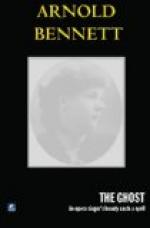One evening he was especially alert and gay, and I not less so. We were in the immense drawing-room, which, like the dining-room, overlooked the canal. Dinner was finished—we dined at six, the Bruges hour—and Alresca lay on his invalid’s couch, ejecting from his mouth rings of the fine blue smoke of a Javanese cigar, a box of which I had found at the tobacco shop kept by two sisters at the corner of the Grande Place. I stood at the great central window, which was wide open, and watched the whiteness of the swans moving vaguely over the surface of the canal in the oncoming twilight. The air was warm and heavy, and the long, high-pitched whine of the mosquito swarms—sole pest of the city—had already begun.
“Alresca,” I said, “your days as an invalid are numbered.”
“Why do you say that?”
“No one who was really an invalid could possibly enjoy that cigar as you are enjoying it.”
“A good cigar—a glass of good wine,” he murmured, savoring the perfume of the cigar. “What would life be without them?”
“A few weeks ago, and you would have said: ’What is life even with them?’”
“Then you really think I am better?” he smiled.
“I’m sure of it.”
“As for me,” he returned, “I confess it. That has happened which I thought never would happen. I am once more interested in life. The wish to live has come back. I am glad to be alive. Carl, your first case has been a success.”
“No thanks to me,” I said. “Beyond seeing that you didn’t displace the broken pieces of your thigh-bone, what have I done? Nothing. No one knows that better than you do.”
“That’s your modesty—your incurable modesty.”
I shook my head, and went to stand by his couch. I was profoundly aware then, despite all the efforts of my self-conceit to convince myself to the contrary, that I had effected nothing whatever towards his recovery, that it had accomplished itself without external aid. But that did not lessen my intense pleasure in the improvement. By this time I had a most genuine affection for Alresca. The rare qualities of the man—his serenity, his sense of justice, his invariable politeness and consideration, the pureness of his soul—had captured me completely. I was his friend. Perhaps I was his best friend in the world. The singular circumstances of our coming together had helped much to strengthen the tie between us. I glanced down at him, full of my affection for him, and minded to take advantage of the rights of that affection for once in a way.
“Alresca,” I said quietly.
“Well?”
“What was it?”
“What was what?”
I met his gaze.
“What was that thing that you have fought and driven off? What is the mystery of it? You know—you must know. Tell me.”
His eyelids fell.
“Better to leave the past alone,” said he. “Granting that I had formed an idea, I could not put it into proper words. I have tried to do so. In the expectation of death I wrote down certain matters. But these I shall now destroy. I am wiser, less morbid. I can perceive that there are fields of thought of which it is advisable to keep closed the gates. Do as I do, Carl—forget. Take the credit for my recovery, and be content with that.”




